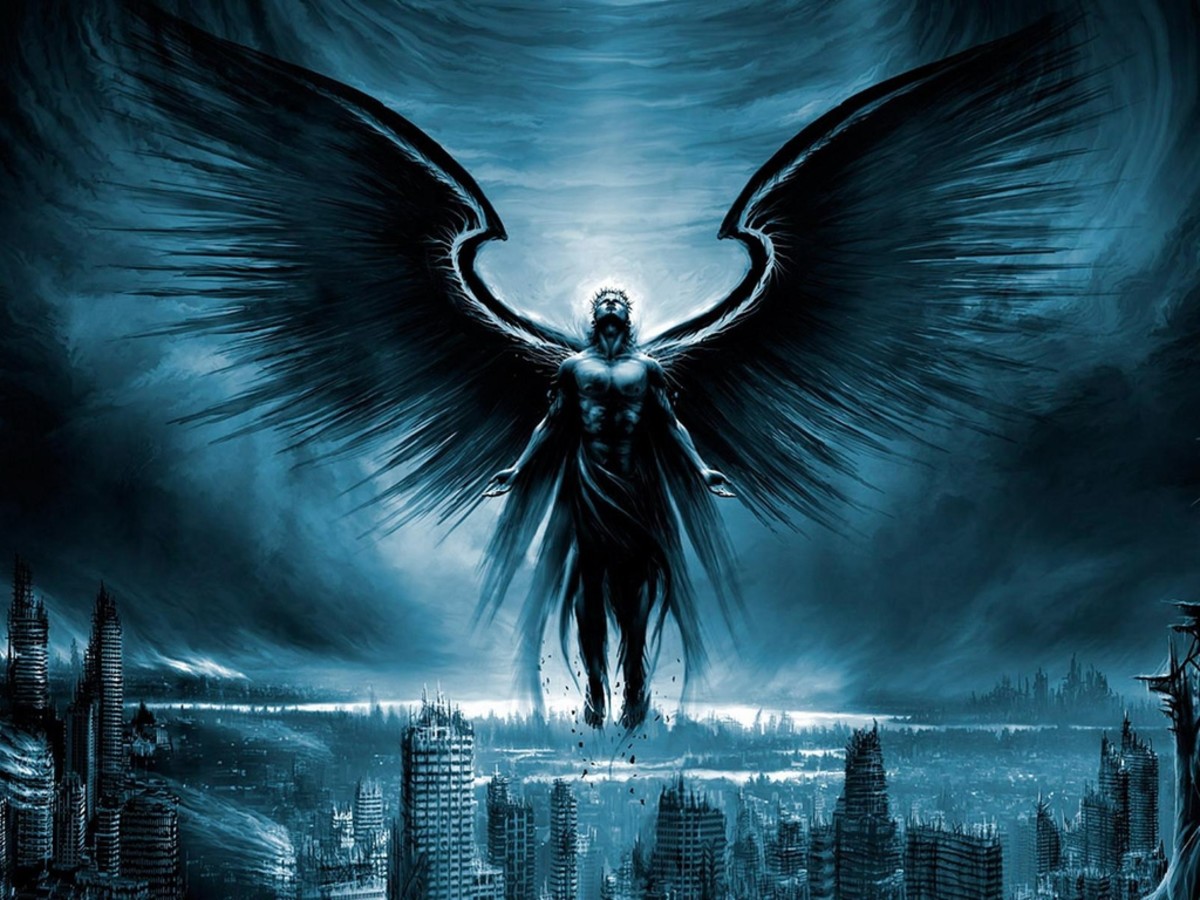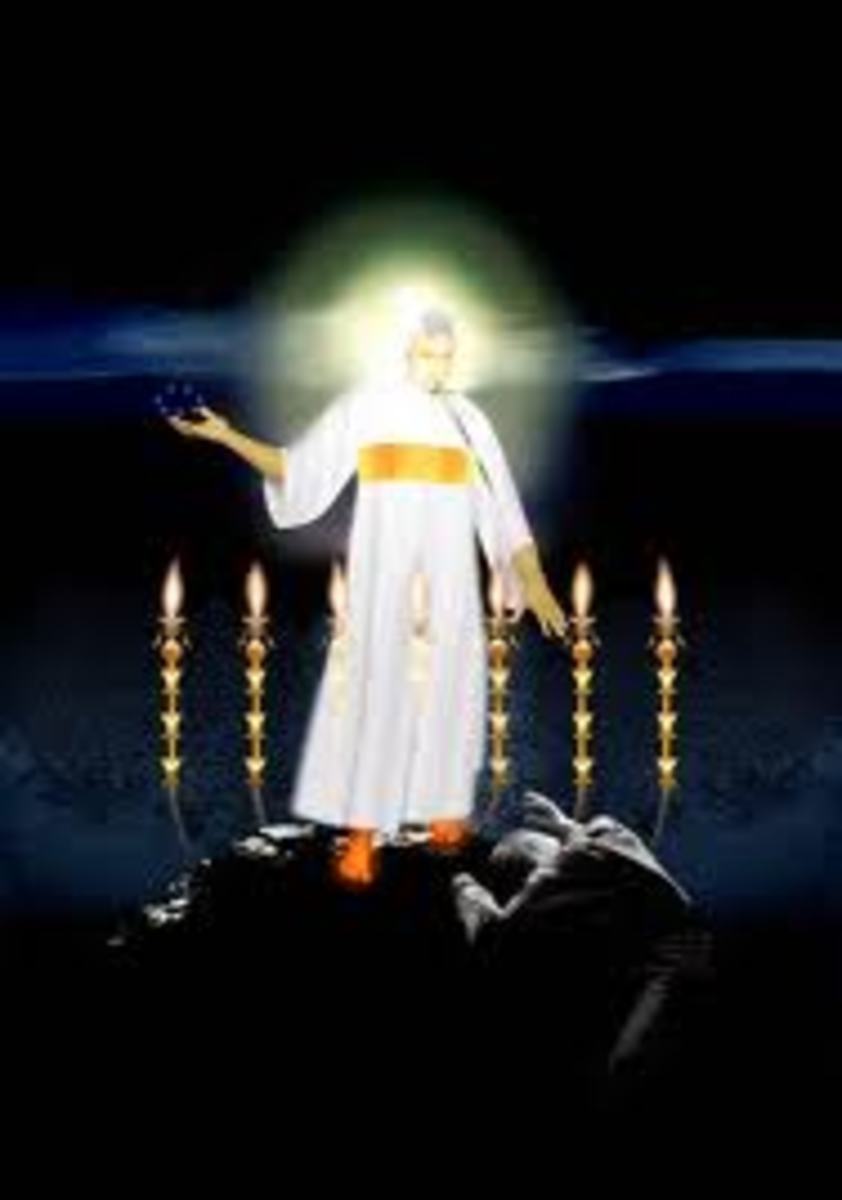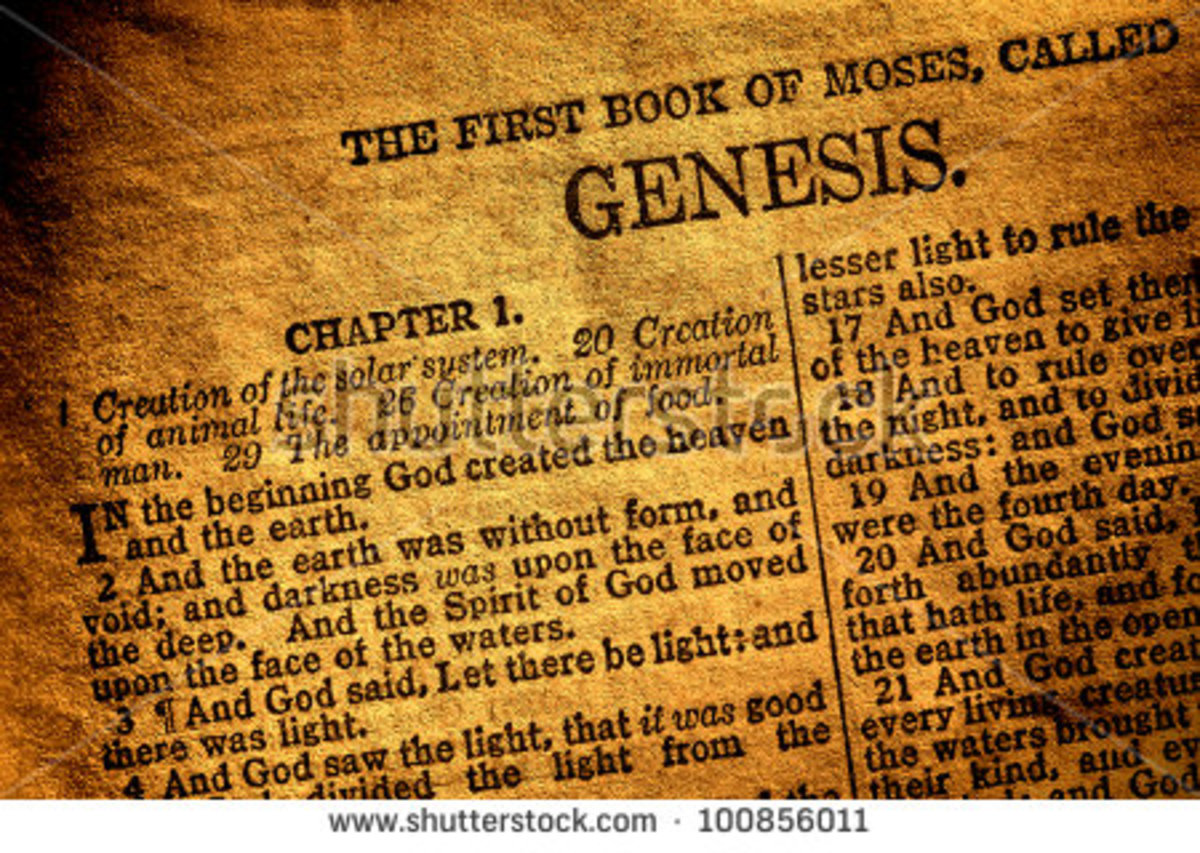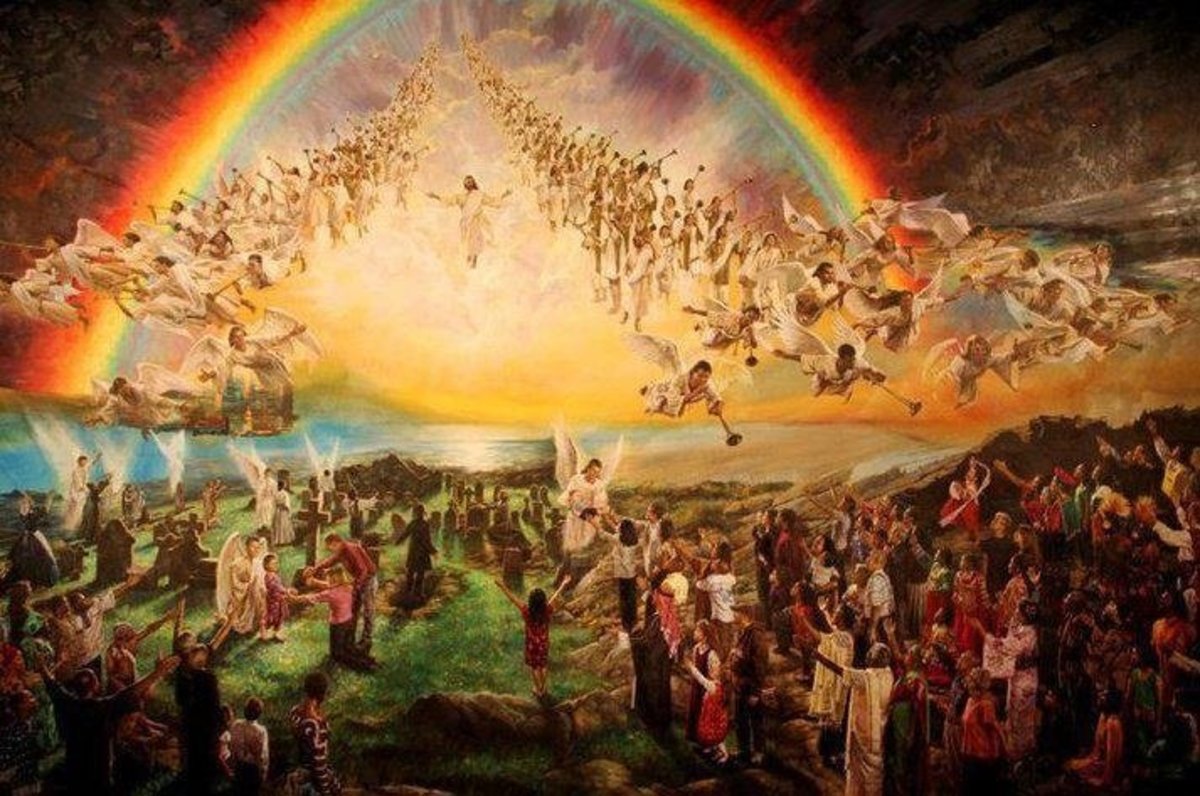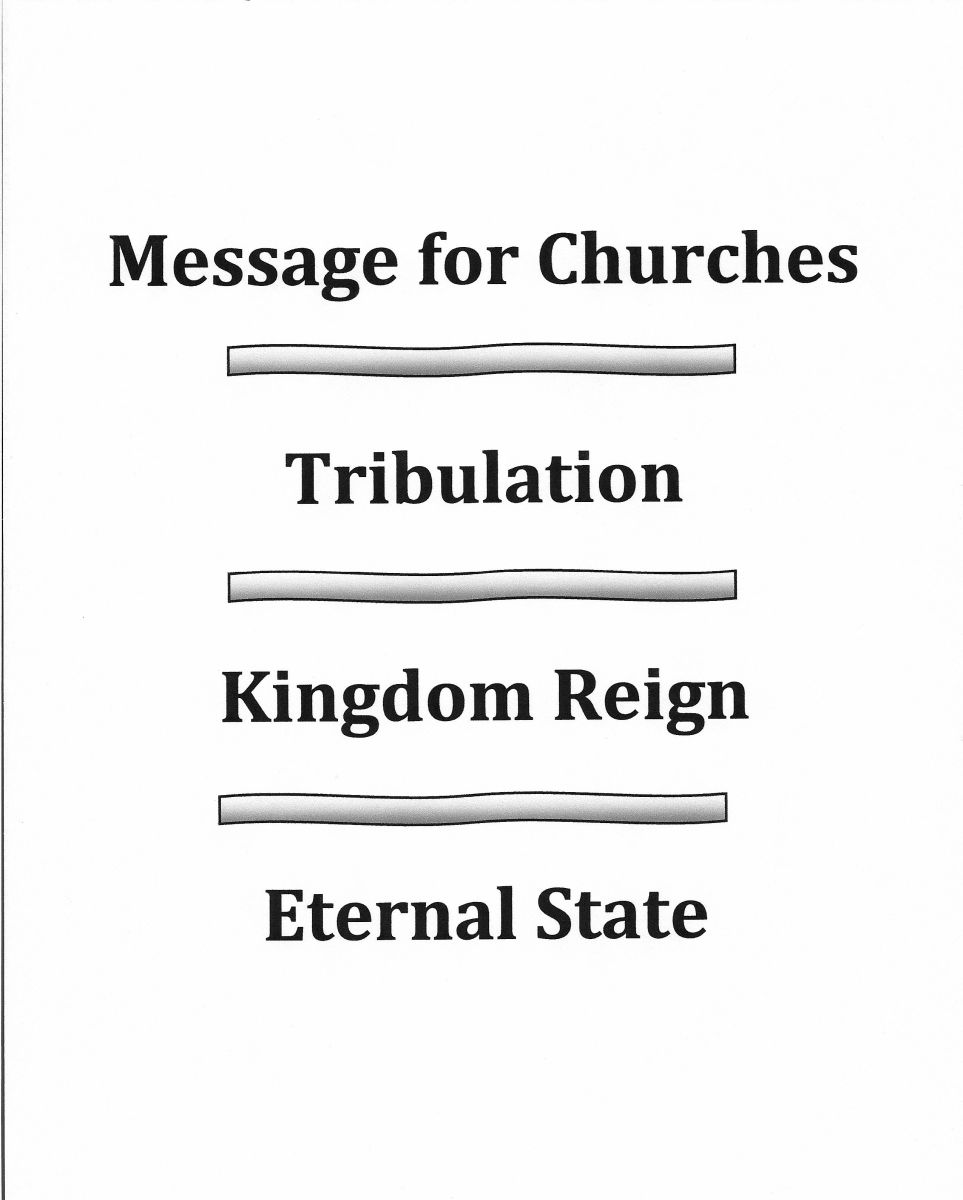The Visions of Revelation; the 16th vision
The sixteenth vision; the seven last plagues;
Rev. 15:1 - 16:21
1 And I saw another sign in heaven, great and marvellous, seven angels having the seven last plagues; for in them is filled up the wrath of God. 2 And I saw as it were a sea of glass mingled with fire: and them that had gotten the victory over the beast, and over his image, and over his mark, and over the number of his name, stand on the sea of glass, having the harps of God. 3 And they sing the song of Moses the servant of God, and the song of the Lamb, saying, Great and marvellous are thy works, Lord God Almighty; just and true are thy ways, thou King of saints. 4 Who shall not fear thee, O Lord, and glorify thy name? for thou only art holy: for all nations shall come and worship before thee; for thy judgments are made manifest. 5 And after that I looked, and, behold, the temple of the tabernacle of the testimony in heaven was opened:
6 And the seven angels came out of the temple, having the seven plagues, clothed in pure and white linen, and having their breasts girded with golden girdles.
7 And one of the four beasts gave unto the seven angels seven golden vials full of the wrath of God, who liveth for ever and ever. 8 And the temple was filled with smoke from the glory of God, and from his power; and no man was able to enter into the temple, till the seven plagues of the seven angels were fulfilled.
16
1 And I heard a great voice out of the temple saying to the seven angels, Go your ways, and pour out the vials of the wrath of God upon the earth.2 And the first went, and poured out his vial upon the earth; and there fell a noisome and grievous sore upon the men which had the mark of the beast, and upon them which worshipped his image.
3 And the second angel poured out his vial upon the sea; and it became as the blood of a dead man: and every living soul died in the sea. 4 And the third angel poured out his vial upon the rivers and fountains of waters; and they became blood.5 And I heard the angel of the waters say, Thou art righteous, O Lord, which art, and wast, and shalt be, because thou hast judged thus. 6 For they have shed the blood of saints and prophets, and thou hast given them blood to drink; for they are worthy. 7 And I heard another out of the altar say, Even so, Lord God Almighty, true and righteous are thy judgments.
8 And the fourth angel poured out his vial upon the sun; and power was given unto him to scorch men with fire. 9 And men were scorched with great heat, and blasphemed the name of God, which hath power over these plagues: and they repented not to give him glory. 10 And the fifth angel poured out his vial upon the seat of the beast; and his kingdom was full of darkness; and they gnawed their tongues for pain,
11 And blasphemed the God of heaven because of their pains and their sores, and repented not of their deeds. 12 And the sixth angel poured out his vial upon the great river Euphrates; and the water thereof was dried up, that the way of the kings of the east might be prepared. 13 And I saw three unclean spirits like frogs come out of the mouth of the dragon, and out of the mouth of the beast, and out of the mouth of the false prophet. 14 For they are the spirits of devils, working miracles, which go forth unto the kings of the earth and of the whole world, to gather them to the battle of that great day of God Almighty. 15 Behold, I come as a thief. Blessed is he that watcheth, and keepeth his garments, lest he walk naked, and they see his shame.
16 And he gathered them together into a place called in the Hebrew tongue Armageddon. 17 And the seventh angel poured out his vial into the air; and there came a great voice out of the temple of heaven, from the throne, saying, It is done. 18 And there were voices, and thunders, and lightnings; and there was a great earthquake, such as was not since men were upon the earth, so mighty an earthquake, and so great.
19 And the great city was divided into three parts, and the cities of the nations fell: and great Babylon came in remembrance before God, to give unto her the cup of the wine of the fierceness of his wrath. 20 And every island fled away, and the mountains were not found. 21 And there fell upon men a great hail out of heaven, every stone about the weight of a talent: and men blasphemed God because of the plague of the hail; for the plague thereof was exceeding great.
After giving the reader a glimpse of what is about to come, John is shown a new sign in heaven; he describes this sign as “great and marvelous”. This great and marvelous sign is He says that he sees seven angels having the final seven plagues. We are told that these last seven plagues “filled up the wrath of God” (vs. 1). Surely by now one would think that those that are still alive would be overwhelmed by all that has happened. While this will probably be true we need to remember that Satan, through his multi-facet deception has blinded the people of the Earth; they are deceived about God. As we shall see Satan will have the people so blinded they attempt to resist; truly a case where black is white, up is down and right is wrong.
In true dramatic literary style John provides this tantalizing comment but does not begin to elaborate about these seven angels or the last seven plagues they will unleash. Instead he begins to speak of another image he observed.
The Sea of Glass
As was stated, John delays revealing any details of the fulfillment of God’s wrath upon the unrepentant people to provide another awesome and yet positive word picture. He tells of seeing “a sea of glass mingled with fire” (vs. 2); there has been some confusion as to what exactly he saw, was it a massive glass plane or a large body of water? John says at the beginning of these verse that he “saw as it were” the Greek word that John used was hōs and it means; as, like, even as, etc[1]. So in other words he did not see a sea of glass, but a sea that was smooth as glass.
We find mention of this glass like sea earlier in Revelation; when John steps through the door he sees in heaven and goes in spirit to the very throne of God he tells of “before the throne there was a sea of glass” (Rev. 4:6). So we see that this sea is in front of the throne of God and is that why it is calm; glass-like. God, in his written word, has used a troubled sea as an analogy of the lost;
But the wicked are like the troubled sea, when it cannot rest, whose waters cast up mire and dirt.
(Isaiah 57:20)
But let him ask in faith, nothing wavering. For he that wavereth is like a wave of the sea driven with the wind and tossed.
(James 1:6)
However the Bible also tells us that it is God that calms the roaring sea;
And I [am] Jehovah thy God, Quieting the sea, when its billows roar, Jehovah of Hosts [is] His name.
(Is. 51:15 Youngs Literal Translation)
Thou rulest the raging of the sea: when the waves thereof arise, thou stillest them.
( Ps. 89:9)
He maketh the storm a calm, so that the waves thereof are still
(Psalm 107:29)
So it is by and through the power of God that this glass-like sea is created; in other words a state of peace. John also mentioned how this glass-like sea is mingled with fire; fire is used to represent a number of things but they are all associated with God; either actions by him or his people;
For I, saith the LORD, will be unto her a wall of fire round about, and will be the glory in the midst of her.
(Zech. 2:5)
For the LORD thy God is a consuming fire, even a jealous God.
(Deut. 4:24)
For our God is a consuming fire.
(Heb. 12:29)
And the light of Israel shall be for a fire, and his Holy One for a flame: and it shall burn and devour his thorns and his briers in one day
(Is. 10:17)
But who may abide the day of his coming? and who shall stand when he appeareth? for he is like a refiner's fire, and like fullers' soap
(Mal. 3:2)
When the Lord shall have washed away the filth of the daughters of Zion, and shall have purged the blood of Jerusalem from the midst thereof by the spirit of judgment, and by the spirit of burning.
(Is. 4:4)
Is not my word like as a fire? saith the LORD; and like a hammer that breaketh the rock in pieces?
(Jer. 23:29)
Who maketh his angels spirits; his ministers a flaming fire
(Ps. 104:4)
And of the angels he saith, Who maketh his angels spirits, and his ministers a flame of fire.
(Heb. 1:7)
John also speaks of seeing a group of people standing on this sea of glass; he does not say how large of a group this is. But it appears that it is the 144,000 that have been identified earlier. Notice that John says of this group on the sea of glass that they are “them that had gotten the victory over the beast, and over his image, and over his mark, and over the number of his name”. Remember in the vision of the Lamb on Mount Sion and John said that with the Lamb was 144,000 (Rev. 14: 1). Remember that this group, seen with the Lamb on Mount Zion, was redeemed from among men and that they are the first fruits unto God (vs. 14: 4).
Further, John also mentions that in this previous vision he heard harpers (vs. 14: 2) and that he also heard them singing a new song before the throne (vs. 14:3) as this new group is reported to be singing two songs; one, the Song of Moses and two, the Song of the Lamb. So it would appear that this group that John sees standing before the throne is the 144,000, the first fruits; having achieved victory over Satan’s beast and not being deceived or forced into receiving the mark of the beast or worshipping it. We have been told how these people achieved this victory; they kept “the commandments of God, and the faith of Jesus” (Rev. 14: 12).[2]
Song of Moses and the Song of the Lamb
As was stated above John relates how this group is singing two songs; the Song of Moses and the Song of the Lamb (vs.3). The Song of Moses was sung by Moses and learned by the Israelites after their miraculous rescue by God at the Red Sea (recounted in Exodus 14). This song is recorded in Exodus 15:1-19 (See Appendix A); it extols God’s miraculous rescue from destruction.[3]
One line, “The LORD is my strength and song, and he is become my salvation” is repeated in a few Old Testament verses (Ps. 118:14 and Is. 12:2). What is significant about these two verses is the situation of Israel when they were written. As was stated the verse was first written after God saved Israel from Pharaoh. They also sang it upon their return from the Babylonian captivity; it is believed that Psalm 118 was written after the return from Babylon. Isaiah 12 looks forward to the time when Israel will be regathered from the nations of the world and returned to her land; so in each case, the song celebrates Israel’s deliverance from an enemy.[4]
There is a curious contrast, in very general terms, in God’s dealing with his chosen people throughout the Bible. In very brief words one can say that the Old Testament depicts the physical, while the New Testament the spiritual or the Old Testament displays the struggle to bring God, his ways and/or his spirit inside and the New Testament depicts God’s spirit being placed inside and it being allowed to flow out. This contrast, the physical versus the spiritual, is also present in these two songs or rather their cause. In the Song of Moses we see God’s chosen people celebrating their deliverance from a physical master whether it be Pharaoh or Babylon and in the Song of the Lamb we see God’s chosen people celebrating their deliverance from a spiritual master, spiritual Babylon or more correctly Satan. Notice how in the Song of Moses they were singing about how Egypt had been thrown down and in the Song of the Lamb they are singing about how Spiritual Babylon has been thrown down. Also in Exodus, they had been delivered by the blood of the Passover lamb, a physical lamb; and in Revelation they overcame the Beast ‘by the blood of the Lamb’ (Rev 12:11). ‘The Lamb’ is the title of Christ most repeated in Revelation; it is used at least twenty-eight times.[5]
The Song of the Lamb is;
Great and marvellous are thy works, Lord God Almighty; just and true are thy ways, thou King of saints. 4 Who shall not fear thee, O Lord, and glorify thy name? for thou only art holy: for all nations shall come and worship before thee; for thy judgments are made manifest.
(Rev. 15:3-4)
While the Song of the Lamb is called a new song and is sung at the second coming of Christ we find many of its elements throughout the Old Testament;
1) Great and marvellous are thy works
- For, lo, he that formeth the mountains, and createth the wind, and declareth unto man what is his thought, that maketh the morning darkness, and treadeth upon the high places of the earth, The LORD, The God of hosts, is his name.(Amos 4:13)
- A Psalm. O sing unto the LORD a new song; for he hath done marvellous things: his right hand, and his holy arm, hath gotten him the victory.(Psalm 98:1)
- Psalm 111:2 The works of the LORD are great, sought out of all them that have pleasure therein. (Psalm 111:2)
- Sing unto him, sing psalms unto him, talk ye of all his wondrous works (I Chronicles 16:9)
2) just and true are thy ways, thou King of saints
- For thou art great, and doest wondrous things: thou art God alone.( Psalm 86:10)
- The LORD is righteous in all his ways, and holy in all his works. (Psalm 145:17)
3) Who shall not fear thee, O Lord, and glorify thy name? for thou only art holy
- Who would not fear thee, O King of nations? for to thee doth it appertain: forasmuch as among all the wise men of the nations, and in all their kingdoms, there is none like unto thee. (Jeremiah 10:7)
4) for all nations shall come and worship before thee
- For from the rising of the sun even unto the going down of the same my name shall be great among the Gentiles; and in every place incense shall be offered unto my name, and a pure offering: for my name shall be great among the heathen, saith the LORD of hosts. (Malachi 1:11)
- All nations whom thou hast made shall come and worship before thee, O Lord; and shall glorify thy name. (Psalm 86:9)
- And the LORD shall be king over all the earth: in that day shall there be one LORD, and his name one…. 16 And it shall come to pass, that every one that is left of all the nations which came against Jerusalem shall even go up from year to year to worship the King, the LORD of hosts, and to keep the feast of tabernacles (Zechariah 14:9)
5) for thy judgments are made manifest
- Remember his marvellous works that he hath done, his wonders, and the judgments of his mouth (I Chronicles 16:12)
The seven angels with the last seven plagues
After giving us this happy image of the redeemed of God singing praises to God John now returns to describing the culmination of God’s wrath upon the beast and the remaining unrepentant people. He begins by telling how he saw the Temple of God in heaven opened and of seeing the seven angels having the seven plagues coming out of the temple (vs. 5-6) He next tells of how one of the four beasts gave the angels seven golden vials that are full of the wrath of God (vs. 7).
John says that after the angels are given the vials containing God’s wrath, actually this is the culmination of God’s wrath (Rev. 15:1), the temple is filled with smoke “from the glory of God, and from his power” and that “no man was able to enter into the temple” and this would last until “the seven plagues of the seven angels were fulfilled” (vs. 8). At this point repentance and salvation is no longer possible; up to the very last moment then it is implied that God has offered people a chance of his protection. However from this point forward the opportunity is no longer available and as we shall see those remaining that has rejected God’s forgiveness and protection still refuse to repentant. Literally until the bitter end they refuse God’s gracious forgiveness, guidance and love.
An interesting item is mentioned about these seven angels that is unique; John mentions their attire, he says there are “clothed in pure and white linen, and having their breasts girded with golden girdles” (vs. 6). Throughout the book of Revelation angels are very frequently mentioned and yet this is the only time John makes a comment about the apparel[6]. The possible explanation for this may be to emphasis that these plagues are from God and are divinely ordered and/or directed. We see repeatedly throughout the book that clean white linen is equated with God and/or the saints (Rev. 3:18; 4:4; 6:11; 7:9, 14; 19:8, 14; 20:11). Maybe this is similar to when a judge is trying a case and is representing justice in his legal duties he is wearing a robe; so to this may be the case with these angels adorn in the clothing they are.
The first six vials poured out
John now describes the angel’s pouring out the vials upon the inhabitants of earth. As he did when describing the opening of the seven seals and the sounding of the seven trumps, John provides a very brief account of the first six items. He tells how the first vial is poured out and all of those that had the mark of the beast or worshipped its image received a very grievous sore (vs. 2). The second is poured out upon the sea and it becomes as the blood of a dead man and whatever was left alive in the sea dies (vs. 3). The third vial is poured out on the rivers and fountains of water and they too become as blood (vs. 4).
John tells us that after the angel pours out the third vial he proclaims that this punishment is just (vs. 5) because ‘they’ have shed the “blood of saints and prophets”. This is an important clue as to the identity of this place which has been briefly referred to earlier in Revelation. While talking of the two witnesses and their murder in the great city, he added that this great city is where “our Lord was crucified” (Rev. 11:8). We know that this city was Jerusalem and we find similar prophecies about Jerusalem receiving similar punishment and for the same offenses;
Woe unto you, scribes and Pharisees, hypocrites! because ye build the tombs of the prophets, and garnish the sepulchres of the righteous, 30 And say, If we had been in the days of our fathers, we would not have been partakers with them in the blood of the prophets. 31 Wherefore ye be witnesses unto yourselves, that ye are the children of them which killed the prophets. 32 Fill ye up then the measure of your fathers. 33 Ye serpents, ye generation of vipers, how can ye escape the damnation of hell? 34 Wherefore, behold, I send unto you prophets, and wise men, and scribes: and some of them ye shall kill and crucify; and some of them shall ye scourge in your synagogues, and persecute them from city to city: 35 That upon you may come all the righteous blood shed upon the earth, from the blood of righteous Abel unto the blood of Zacharias son of Barachias, whom ye slew between the temple and the altar…37 O Jerusalem, Jerusalem, thou that killest the prophets, and stonest them which are sent unto thee
(Matt. 23:29-35, 37 emphasis added)
Son of man, cause Jerusalem to know her abominations…15 But thou didst trust in thine own beauty, and playedst the harlot because of thy renown, and pouredst out thy fornications on every one that passed by; his it was…38 And I will judge thee, as women that break wedlock and shed blood are judged; and I will give thee blood in fury and jealousy.
(Ezekiel 16:2, 15, 38 emphasis added)
There is no indication from John’s writing if these final events happen at the same time or successfully; in very terse writing John tells of the pouring out of the next three vials. The fourth vial poured out affects the sun and mankind is scorched with great heat and they still refuse to repentant but instead curse God for their suffering (vs. 8-9). The fifth angel pours out his vial upon the seat of the beast and his kingdom is filled with darkness. Some have pointed to the similarities between these plagues and the plagues God inflicted on Egypt while the Israelites were captive there. The plague right before the final one, the death of the first born of Egypt, was darkness (Ex. 10:22). While John does not indicate if this plague that is inflicted is the same as what was placed upon Egypt for this Godly created plague of darkness was no ordinary darkness, for God told Moses that this darkness would be “which may be felt” (Ex. 10:21).
As was said this darkness was no simple period of diminished light; it was a supernatural darkness in which there was a total absence of light, such as the bottom of a mine. The darkness is described as being so great that it could be felt. Further, the description, "thick darkness" in verse 22 is literally "darkness of obscurity" or "dark darkness" where two synonyms for darkness are combined for emphasis like “black dark.”[7] The darkness was so great that the Egyptians saw no one nor did they rise from their places for three days. However, the Israelites had light in their dwellings (Ex. 10:23).
As was said John does not specifically indicate that this darkness that is placed upon the Beast’s kingdom is the same as that which was placed over Egypt and there are some indications are that it might, but there are also indicators that point towards a more metaphoric application. The Greek word that is rendered as ‘seat’ is thronos[8]. It is defined as:
1) a throne seat
a) a chair of state having a footstool
b) assigned in the NT to kings, hence, kingly power or royalty
1) metaph. to God, the governor of the world
2) to the Messiah, Christ, the partner and assistant in the divine administration
a) hence divine power belonging to Christ
3) to judges i.e. tribunal or bench
4) to elders
So it could be seen that this plague of darkness involves more of a darkening of the minds of the rulers of the nations of the beast empire. This possibility is enhanced when we note that John says that “they gnawed their tongues for pain, 11 And blasphemed the God of heaven because of their pains and their sores, and repented not of their deeds.” (vs. 10-11). While he does not indicate who they are it is safe to assume, based on what the verses say that he is speaking of the people in the Beast’s kingdom. Notice that it says they were in pain and they blasphemed God for their pains (4th vial) and their sores (1st vial), but there is no mention of the darkness which would tend to support the belief that this is more a darkness of the mind or of their reasoning. This contention finds support when we look at what John says about the evil spirits speaking through the mouths of the dragon, the beast and the false prophet which shall be discussed shortly.
Finally John tells of the sixth angel pouring out his vial and it dries the waters of the Euphrates River. This in turn prepares the way of some nations, John says Kings, from the East (vs. 12). This is the only mention of these kings; who they are John does not say nor give any clue as to their identity. While it would only be pure speculation the current list of potential members of this group would obviously have to be China and India.
Three unclean spirits
After giving us that irritatingly brief comment about the unidentified kings of the east John next speaks of three spirits. He tells us that he saw three unclean spirits coming out of the mouths of the dragon, the beast and the false prophet. This is the first time in Revelation that John uses the title the false prophet. While this is the first time he uses this appellation he had already spoken of this being and described his activities. He described this entity back in chapter 13:
11 And I beheld another beast coming up out of the earth; and he had two horns like a lamb, and he spake as a dragon. 12 And he exerciseth all the power of the first beast before him, and causeth the earth and them which dwell therein to worship the first beast, whose deadly wound was healed. 13 And he doeth great wonders, so that he maketh fire come down from heaven on the earth in the sight of men, 14 And deceiveth them that dwell on the earth by the means of those miracles which he had power to do in the sight of the beast; saying to them that dwell on the earth, that they should make an image to the beast, which had the wound by a sword, and did live. 15 And he had power to give life unto the image of the beast, that the image of the beast should both speak, and cause that as many as would not worship the image of the beast should be killed. 16 And he causeth all, both small and great, rich and poor, free and bond, to receive a mark in their right hand, or in their foreheads: 17 And that no man might buy or sell, save he that had the mark, or the name of the beast, or the number of his name.
While John speaks of this entity with a singular pronoun, he, seeing the powers he has it is obvious that this can not be a single individual but more likely an organization. From what John tells of this false prophet it would appear to be a false religious organization; in other words a false church. This false church appears as a legitimate Christian church and will be world-wide and possessing significant political power. Remember that John tells us that this false prophet will deceive the world with the miracles it performs (13:14) so one had best heed the directive to “Prove all things; hold fast that which is good” (I Thess. 5:21).
John says that these spirits are unclean an examination of the original words will provide a better understanding of how they are unclean; what is it they do that makes them this way. The Greek word rendered as unclean is akathartos[9]and is defined as; 1) not cleansed, unclean a) in a ceremonial sense: that which must be abstained from according to the levitical law b) in a moral sense: unclean in thought and life.[10] The Greek word translated as spirit is pneuma and is defined as[11];
1) the third person of the triune God, the Holy Spirit, coequal, coeternal with the Father and the Son
a) sometimes referred to in a way which emphasises his personality and character (the "Holy" Spirit)
b) sometimes referred to in a way which emphasises his work and power (the Spirit of "Truth")
c) never referred to as a depersonalised force
2) the spirit, i.e. the vital principal by which the body is animated
a) the rational spirit, the power by which the human being feels, thinks, decides
b) the soul
3) a spirit, i.e. a simple essence, devoid of all or at least all grosser matter, and possessed of the power of knowing, desiring, deciding, and acting
a) a life giving spirit
b) a human soul that has left the body
c) a spirit higher than man but lower than God, i.e. an angel
1) used of demons, or evil spirits, who were conceived as inhabiting the bodies of men
2) the spiritual nature of Christ, higher than the highest angels and equal to God, the divine nature of Christ
4) the disposition or influence which fills and governs the soul of any one
a) the efficient source of any power, affection, emotion, desire, etc.
(emphasis added)
So it would seem that these spirits are unclean because of the thoughts or beliefs they espouse and this tends to support the belief that the darkness that is poured out upon the kingdom of the beast is more a mental darkness. That through the actions of these three spirits, which John says are devils, the thinking of the people is darkened or blinded as to God’s truth.
John describes these unclean spirits as being like frogs (vs. 13). Other then the plague of frogs which God placed upon Egypt (Ex. 8:2-13) and two verses in Psalms (Ps. 78:45; 105:30) this is the only place that frogs are mentioned in the Bible. Why God chose to portray these unclean spirits as frog-like is open to conjecture. One possible explanation may be that God selected this symbol as a form of divine irony considering the Ancient world’s belief about frogs. In the Ancient world frogs, as creatures of the underworld, symbolized the creation of life. One of the Egyptian words denoting 'frog' is wHm-anx, meaning literally 'He who repeats life'[12]. Also the frog represents the goddess Heqat in ancient Egypt she was represented as a woman with a frog head and was a goddess of fertility and rebirth in the afterlife. John tells us that these unclean spirits are the “spirits of devils” (vs. 14). Recall that the way of God is the way of life (Jer. 21:8) and disobeying God leads to death. Since Satan and his cohorts are in direct opposition to God and his way then these unclean spirits can only lead to death and not to life or a rebirth as the frog was believed to represent.
These spirits work miracles and they go forth to the kings of the earth. It is through these miracles that they are able to incite the kings and cause them to gather “them to the battle of that great day of God Almighty” (vs. 14). John does not tell what the miracles are that these three spirits conduct to deceive the kings of the earth and there is no indication if these miracles are related to the miracles that the false prophet commits which helps to deceive the world and to accept the beast’s mark (Rev. 13:13-14).
A place called Armageddon
To many Armageddon means the last great battle between Christ and the Devil; in fact, Merriam-Webster has Armageddon defined as;
ARMAGEDDON
1 a: the site or time of a final and conclusive battle between the forces of good and evil b : the battle taking place at Armageddon
2: a usually vast decisive conflict or confrontation[13]
Many erroneously speak of this great end-time battle occurring at Armageddon a casual examination of this verse clearly shows that John said the armies simply gather there. There is no mention of a future great battle happening there. As was pointed out in the discussion about the previous vision and specifically the winepress of God; this great battle occurs in the Kidron valley[14].
The seventh vial
John now tells of the pouring out of the seventh vial; he says it is poured into the air and that a great voice comes out of the temple of heaven, saying, “It is done” (vs. 17). He next says that there was “voices, and thunders, and lightnings” (vs. 18). It is interesting in that this mention of voices, lighting and thundering occurs three other times in Revelation (4:5; 8:5 and 11:19). What is common among these verses is that the noise mentioned is the result of an activity occurring before the heavenly Throne of God. We find a similar occurrence in the Old Testament; when the Lord descended upon Mount Sinai we read:
And it came to pass on the third day in the morning, that there were thunders and lightnings, and a thick cloud upon the mount, and the voice of the trumpet exceeding loud; so that all the people that was in the camp trembled.
(Ex. 19:16)
John also speaks of a great earthquake happening. One finds repeated references to earthquakes in Revelation and not small-scale local earthquakes but huge ones (6:12; 8:5; 11:13, 19). Again it is significant that these earthquakes happen at key moments of the events relating to the Day of the Lord. The first “great earthquake” is mentioned at Rev. 6:12 and it happens after the opening of the sixth seal and remember the seventh seal is made up of the events of the Day of the Lord (Rev. 6: 16-17). The next earthquake referred to happens after the opening of the seventh seal (Rev. 8:5) just prior to the angels sounding the seven trumps. The next “great earthquake” is talked about in chapter thirteen (vs. 13 & 19) and happens at the second coming of Christ.
This particular earthquake is also prophesied in the Old Testament;
And his feet shall stand in that day upon the mount of Olives, which is before Jerusalem on the east, and the mount of Olives shall cleave in the midst thereof toward the east and toward the west, and there shall be a very great valley; and half of the mountain shall remove toward the north, and half of it toward the south.
(Zechariah 14:4)
John does not describe how extensive the carnage will be from these earthquakes other then his comment about the last one that “there was a great earthquake, such as was not since men were upon the earth, so mighty an earthquake… the cities of the nations fell… And every island fled away, and the mountains were not found” he does talk of the damage and earth toll that happens to Jerusalem from this last earthquake and the quake that occurs at Christi’s return. We are told that the first quake’s effect on Jerusalem will be that a “tenth part of the city fell, and in the earthquake were slain of men seven thousand” (11:13). The last quake compounds the damage upon the city; “And the great city was divided into three parts” (Rev. 16:19).
While there are three references to earthquakes in chapter 11 it is possible that this is not referring to the same event. The first two references to an earthquake, which we know happens upon the return of Christ, the third reference is probably referring to this last great earthquake. Looking back to the second earthquake mentioned in chapter eleven we find clues that point to this occurring at the pouring out of the seventh vial. First, John mentions that the nations are angry (11:18) and we know that the work of the three unclean spirits was to deceive the nations and gather them for the great battle. Also John mentioned that the nations were angry because God’s wrath had come upon them (11:18). Further John relates of a voice from heaven saying “it is done” (16:17); recall that prior to the seven vials being poured out the temple in heaven was essentially closed (15:8) and in chapter eleven we are told that the temple in heaven is opened and there is the reference to voices, thunders and lightning (11:19). The final item that supports the belief that this is speaking of this great earthquake is John makes a comment about great hail.
In chapter eleven John simply makes mention of a great hail (11:19); however in talking about the pouring out of the seventh vial he provides a little more information about this great hail. After this great earthquake John mentions this great fall of hail from heaven. While he does not say if anyone is killed as a result of this great hail it would be a safe assumption that there will be fatalities, unless of course God supernaturally shields the remaining humans from death. John says that the hail stones were equal in weight to a talent. If we assume that John was referring to a Jewish talent then they would weigh 113 pounds[15].
Just before this great hail storm from heaven John tells us that Babylon came into remembrance before God so that he would give her the cup of the wine of the fierceness of his wrath (vs. 19). As what appears his style John provides us with no more information after this statement; shortly God will more fully reveal to John and hence, in turn, us what happens to Babylon.
[1] Strong's G5613 – hōs
[2] While this group of people before the throne of God is initially composed of the 144,000 John reveals that this group eventually expands to a great multitude (Rev. 7:9)
[3] “Tradition informs us that the "Song of Moses" was sung in sections (one for each Sabbath) in the Temple, at the close of the Sabbath-morning service. The Song of Moses consists of three stanzas (Exodus 15:2-5, 6-10, and 11-18), of which the first two show the power of Jehovah in the destruction of His enemies, while the third gives thanks for the result, in the calling of Israel to be the kingdom of God, and their possession of the promised inheritance.” -- Wiersbe’s Expository Outlines on the New Testament
[4] Wiersbe’s Expository Outlines on the New Testament
[5] Wiersbe’s Expository Outlines on the New Testament
[6] John does mention that the angel with little book was clothed in a cloud and had a rainbow upon his head (Rev. 10:1)
[7] http://www.biblenews1.com/egypt/plagues3.html#Darkness
[8] Strong's G2362 - thronos
[9] Strong's G169 – akathartos
[10] "unclean, impure" (a, negative, and kathairo, "to purify" Vine’s Expository Dictionary of New Testament Words
[11] Strong's G4151 – pneuma
[12] http://www.reshafim.org.il/ad/egypt/bestiary/frog.htm
[13] http://www.merriam-webster.com/dictionary/armageddon
[14] See Joel 3:11-14; also in Biblical times the Kidron valley was known as the Valley of Jehoshaphat.
[15] However anAttic talent was equal to about 55-56 lbs

